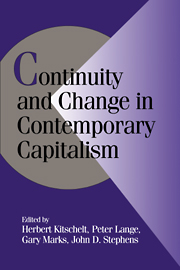Book contents
- Frontmatter
- Contents
- List of Contributors
- Preface
- Introduction
- PART I THE INTERNATIONAL SETTING FOR POLITICAL-ECONOMIC STRATEGIES
- 1 The Global Economy, Post-Fordism, and Trade Policy in Advanced Capitalist States
- 2 The Internationalization of Capital
- 3 The Making of a Polity: The Struggle over European Integration
- PART II THE DYNAMICS OF DOMESTIC POLITICAL ECONOMIES
- PART III POLITICAL ECONOMY AND DEMOCRATIC COMPETITION
- PART IV CONCLUSION
- References
- Index
- Title in the series
2 - The Internationalization of Capital
Published online by Cambridge University Press: 05 June 2012
- Frontmatter
- Contents
- List of Contributors
- Preface
- Introduction
- PART I THE INTERNATIONAL SETTING FOR POLITICAL-ECONOMIC STRATEGIES
- 1 The Global Economy, Post-Fordism, and Trade Policy in Advanced Capitalist States
- 2 The Internationalization of Capital
- 3 The Making of a Polity: The Struggle over European Integration
- PART II THE DYNAMICS OF DOMESTIC POLITICAL ECONOMIES
- PART III POLITICAL ECONOMY AND DEMOCRATIC COMPETITION
- PART IV CONCLUSION
- References
- Index
- Title in the series
Summary
The internationalization and integration of capital markets has been the most significant change in the political economy of the industrialized countries over the past three decades. From the Great Depression to the Bretton Woods period, capital markets developed largely within national boundaries. Yet the past three decades have witnessed historically unprecedented growth in cross-border capital movements that have surpassed those of the late nineteenth century, often thought of as a golden age of international finance. Moreover, since World War II, the integration of capital markets has been far more rapid and complete among the industrialized countries than has the integration of markets for goods and services. No other area of the economy has been so thoroughly internationalized as swiftly as have capital markets since the 1970s.
The consequences of such rapid and fundamental change have begun to unfold in a number of countries. More highly integrated capital markets may erode governments' ability to use monetary and even fiscal policies to stimulate the economy. At the same time, newly liberalized capital markets and the growth in foreign investment opportunities may alter the balance of power between relatively immobile labor and capital with a credible “exit option,” potentially with significant consequences for domestic institutions and policy outcomes.
The purpose of this essay is to describe the recent internationalization of capital, and to explore the implications for the industrialized countries of the Organization for Economic Cooperation and Development (OECD).
- Type
- Chapter
- Information
- Continuity and Change in Contemporary Capitalism , pp. 36 - 69Publisher: Cambridge University PressPrint publication year: 1999
- 38
- Cited by

